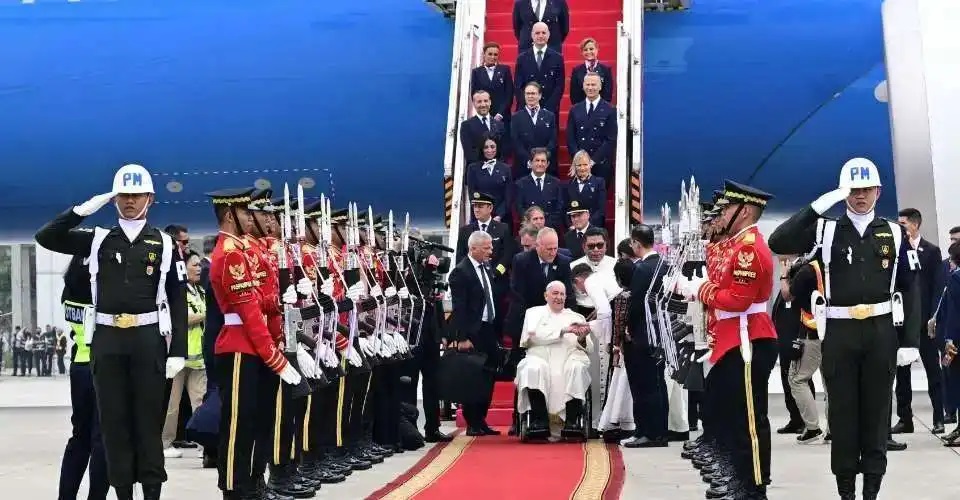Pope Francis' visit left a lasting impact on Indonesians
Historic trip in 2024 cemented Catholic-Muslim relations, inspiring many to respond to his call for solidarity and love
Apr 21, 2025

By Justin Wejak
Francis’ legacy as a pope of mercy, reform, and interfaith dialogue left a lasting impact on both the Church and the broader world.
The world watched with deep concern as he battled a serious illness, that left him weak and unable to carry out his usual duties. Global religious leaders, political figures, and millions of devoted Catholics were praying for him.
Renowned for his humility and resilience, Pope Francis faced his suffering with the same grace that had characterized his papacy, urging the Church to remain steadfast in its mission of compassion and service.
Interfaith dialogue
In Indonesia, a country noted for its religious diversity and strong interfaith values, people will remember Pope Francis as a leader who emphasized compassion, humility, and dialogue among different religious communities.
His efforts to foster peace and understanding among people of various faiths resonated with Indonesia's national motto, Bhinneka Tunggal Ika (Unity in Diversity).
Pope Francis consistently advocated for harmonious coexistence, which resonated deeply in Indonesia, where Muslims, Christians, Hindus, Buddhists, Confucianists, and other faith groups live side by side.
His historic visit to the Muslim-majority nation in 2024 and his endeavors to strengthen Catholic-Muslim relations were particularly appreciated by Indonesians, as the country itself worked to uphold religious tolerance.
During that visit, he received a warm and enthusiastic welcome from both Catholics and followers of other faiths.
This was the first papal visit to the country in decades, and his arrival was celebrated with grand festivities, interfaith gatherings, and warm receptions from religious leaders and government officials.
Thousands of Indonesians lined the streets to welcome him, reflecting the nation’s deep respect for his message of peace, unity, and compassion.
During his visit, he stressed the importance of religious harmony, praised Indonesia’s dedication to diversity, and encouraged the faithful to continue fostering dialogue and understanding.
His presence had a lasting impact, strengthening ties between the Vatican and Indonesia while inspiring many to respond to his call for solidarity and love.
A compassionate pope
Indonesian Catholics, a small yet significant minority, will likely remember Pope Francis as a shepherd who cared deeply for the marginalized and the poor.
His emphasis on social justice, environmental care, and advocacy for migrants and the underprivileged reflected the values many Indonesian Catholics uphold daily.
Many churches in Indonesia actively participate in community outreach programs, and Pope Francis’ teachings on love, mercy, and service strengthened their dedication to assisting those in need.
His encyclicals, such as Laudato Si’, which focused on environmental responsibility, resonate in Indonesia, a country grappling with deforestation and climate change.
The encyclical, published in 2015, delivered a powerful message about the urgent need to care for our common home, the Earth.
Rooted in Catholic social teaching, it called for ecological conversion, urging individuals, governments, and businesses to take responsibility for the environment and confront the devastating impacts of climate change, pollution, and biodiversity loss.
Pope Francis emphasized that environmental destruction disproportionately affects the poor and marginalized, making ecological justice a moral imperative.
He critiqued consumerism, excessive reliance on fossil fuels, and economic systems that prioritize profit over people and the planet. Instead, he advocated sustainable development, responsible stewardship of natural resources, and a renewed sense of global solidarity to protect creation for future generations.
His message will serve as both a spiritual and ethical call to action, encouraging humanity to embrace a more harmonious relationship with nature.
The younger generation of Indonesians, particularly those involved in social activism and humanitarian work, will likely remember Pope Francis as a progressive leader who championed human rights and inclusivity.
His support for youth engagement, education, and digital connectivity aligned with Indonesia’s rapidly growing young population, which is becoming increasingly active in global discussions about justice and equality.
Many young Indonesians admire leaders who challenge social inequalities, and Pope Francis’ outspoken stance against corruption, economic disparity, and discrimination will undoubtedly leave a lasting impression on them.
His efforts to make the Catholic Church more open and welcoming, especially to marginalized communities, were viewed as an inspiring model for religious institutions in Indonesia.
Peace and reconciliation
Indonesians will remember Pope Francis’ emphasis on peace and reconciliation in the context of past religious and ethnic conflicts in the country.
As we know, Indonesia has experienced numerous religious and ethnic conflicts throughout its history, often arising from political, economic, and social tensions.
One of the most notable periods of violence occurred during the late 1990s and early 2000s, particularly in regions like Maluku, Poso (Central Sulawesi), and West Kalimantan.
In Maluku, long-standing tensions between Christian and Muslim communities escalated into violent clashes, resulting in thousands of deaths and widespread displacement.
In Poso, sectarian violence similarly erupted, driven by competition for resources and political power.
Ethnic conflicts also emerged, such as the tensions between Indigenous Dayaks and Madurese migrants in Kalimantan, leading to deadly riots and mass turmoil displacement.
Pope Francis’ calls for forgiveness and healing aligned with the efforts of many Indonesian leaders and activists who tirelessly work to bridge divides and create a more harmonious society.
His ability to connect with people of various faiths and nationalities reminded us that religious leaders can be powerful advocates for unity, not division.
In a nation that continues to navigate the complexities of multiculturalism, Pope Francis’s legacy embodies bridge-building, compassion, and a steadfast commitment to the common good.
His legacy will endure, and his message of love and solidarity will continue to inspire Indonesians to foster a more just, compassionate, and inclusive society.--ucanews.com







Total Comments:0